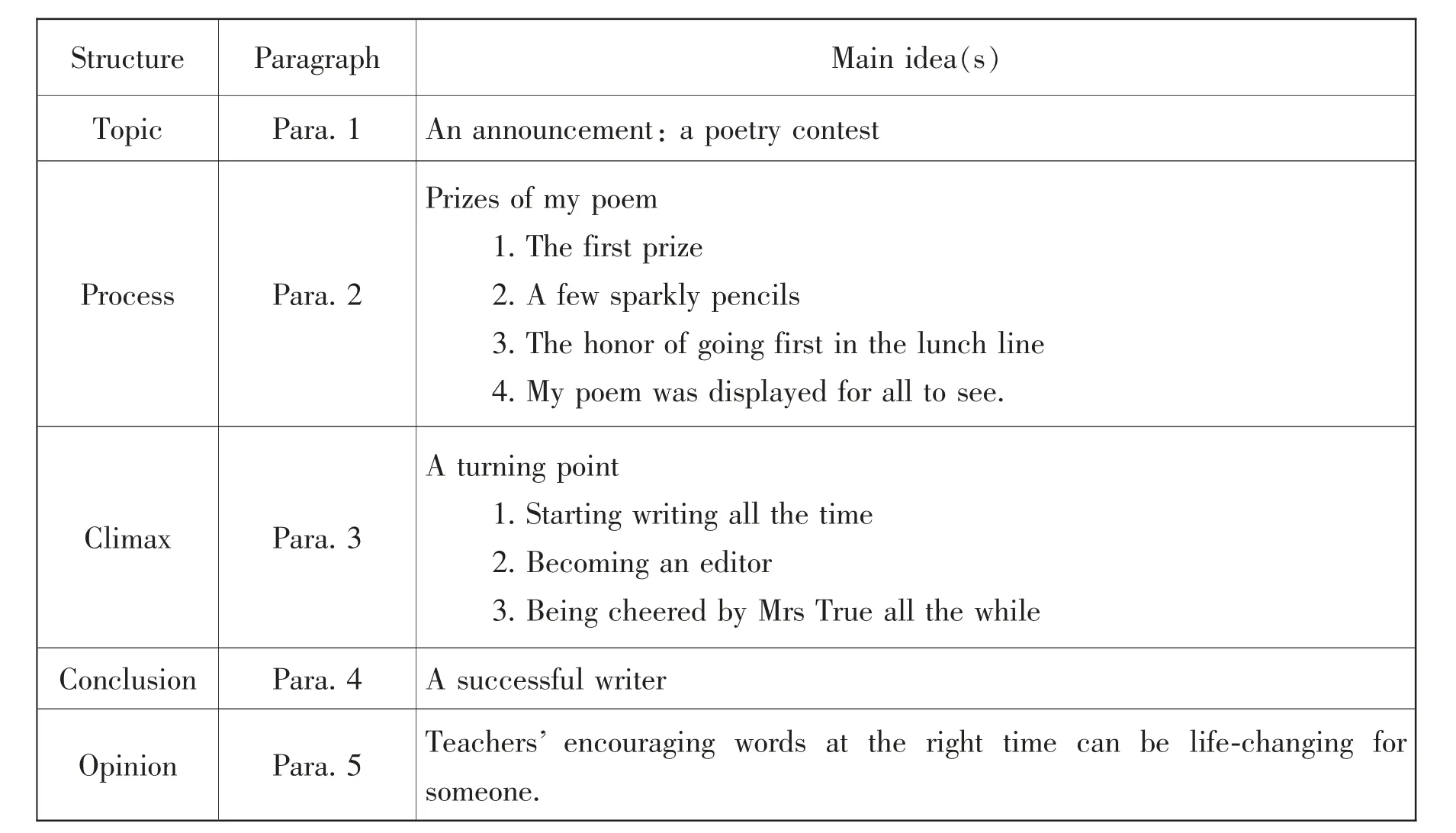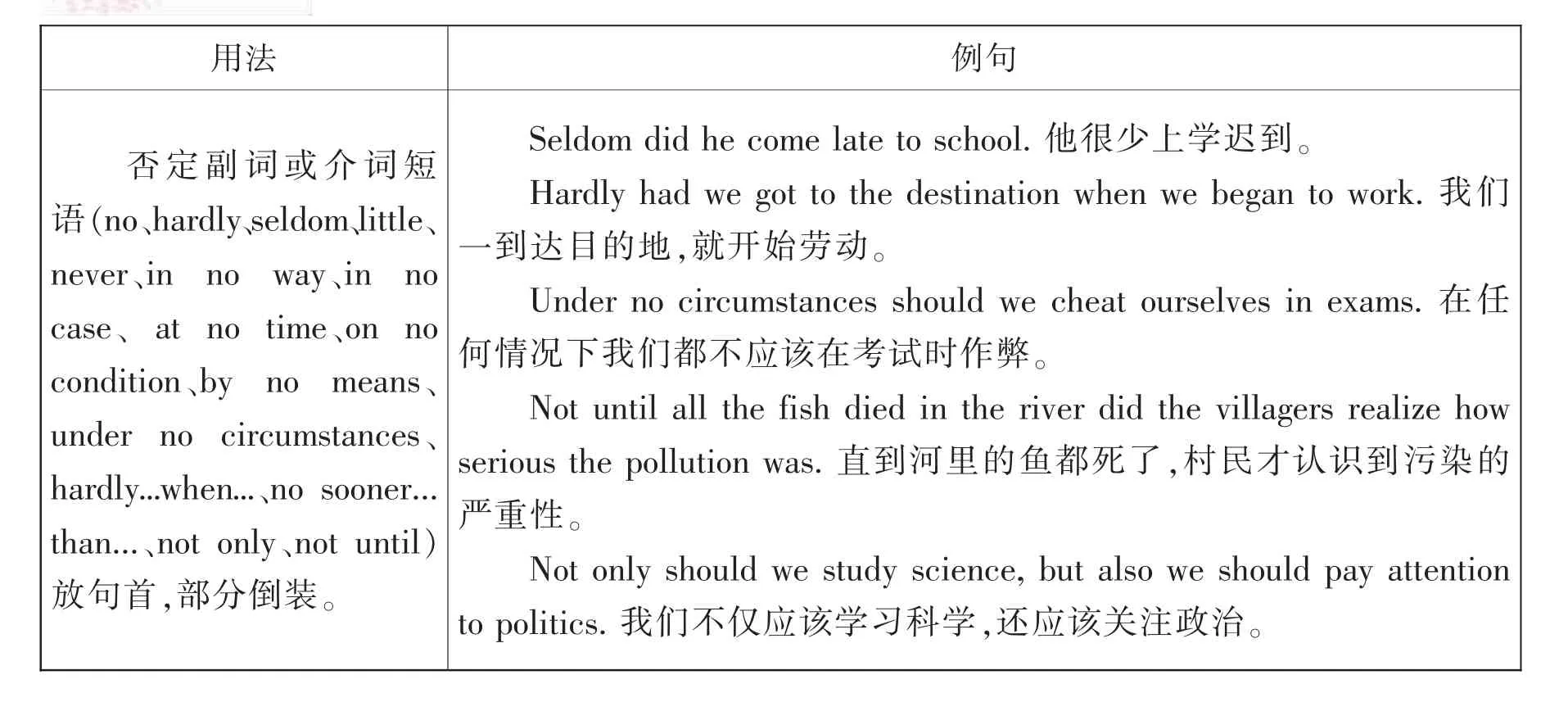An announcement that would forever change my life
湖南岳阳华容二中 张明波
海词积累
1. rhyme /raɪm/ v. 押韵
2. craft /krɑːft/ v. 精心制作
3. sparkly /΄spɑːkli/ adj. 闪闪发光的
预读思考
1. Why did the author refer to the poetry contest as a turning point in his life?
2. What's the sentence order when little is used as the first word in a sentence?
When I was in first grade, my teacher Mrs True made an announcement, “We're having a poetry contest this week. Use today and tomorrow to come up with your best poem.” We had just studied the various types of poems, and I decided I really liked the ones thatrhymed.
As my classmates wrote about their parents,grandparents, aunts and uncles, brothers and sisters, I carefullycraftedthe words to my poem:I Love Penny. Penny was my 7-year-old dog and my best friend in the whole world. My poem was good enough to win first prize. At any rate, I won a fewsparklypencils and the honor of going first in the lunch line. Mrs True also displayed my poem in the front of the room for all to see. I felt very special.
Little did Mrs True know that her lesson on poetry contest was a turning point in my life.After winning that writing contest I thought to myself, “Hey, I am actually good at something.Maybe I should do more of this writing stuff.” I started writing all the time. I wrote poems about every member of my family. I wrote short stories about two lovely animals. I even became the editor of my elementary school newspaper. And all the while, Mrs True was cheering me on.
Today, when I make appearances at elementary schools and read my children's books to the students, I am always asked:“When did you become a writer?” Without missing a beat I always answer quickly, “In first grade...when Mrs True taught me about poetry,and I won a contest for a poem about my big, fat dog.”
Teachers make such an impact on who we become as adults. They have a voice into our young, eager hearts, and that voice may be the only one that offers an encouraging word. I'm so thankful to Mrs True and teachers like her who challenge young people to follow their dreams.Offering an encouraging word at the righttime can be life-changing for someone.Why not be a “Mrs True” in somebody's life today?

阅读检测
1. What can we know about the author's poem for the contest?
A. He wrote about lovely animals.
B. He wrote about his big, fat dog.
C. It won him reading before class.
D. It displayed his family members.
2. What does the underlined word “something” in Para. 3 refer to?
A. Giving classes. B. Winning prizes.
C. Editing. D. Writing.
3. What resulted in the author's success in his opinion?
A. His own hardworking. B. His own intelligence.
C. Mrs True's continuous encouragement. D. Mrs True's praise before the contest.4. What can we infer about teachers according to the author?
A. They are supposed to teach poems often.
B. They can change a student’s life forever.
C. They offer encouraging words frequently.
D. They inspire students to be teachers.
文本探究
探究视角1:语篇分析
教师是学生最经常接触、最直接、最具权威性的榜样,教师每天与学生接触6至9小时,甚至更长,而父母虽然每天与孩子在一起10多个小时,但其中睡眠时间占多半。 教师与学生“有效接触”的时间远远多于家长,因而使其更容易用自己的情感、意志、行为去熏陶和影响学生。 教师的一言一行、一举一动是他们模仿的对象。教师对学生的影响是深刻且巨大的。这些影响,不仅体现在教师组织、实施教育教学的行为过程中,还体现在教师自身的心理倾向、思想水平、人格魅力和知识的渊博度等,这些都会对学生产生不可估量的影响。
阅读记叙文时,除了要弄清楚记叙文的要素“时间、地点、人物、事件和结果”之外,还要关注记叙文的结构。 记叙文结构是作品谋篇布局的整体设计。 主要组成部分:主题—过程—高潮—结果—评价。 主题部分往往是事件的原因,是引子;过程部分是对事件发展的叙述;高潮部分通常是经历某个事件所带来的巨大改变,是读者关注的中心;结果部分是某一事件最终的结果展示;评价部分是某个事件对读者所带来的有普遍意义的启示。 撰写记叙文时,要根据实际情况采用合适的结构去灵活多样地展示事件。
本文的篇章结构如下:

Structure Paragraph Main idea(s)Topic Para. 1 An announcement: a poetry contest Prizes of my poem 1. The first prize 2. A few sparkly pencils 3. The honor of going first in the lunch line 4. My poem was displayed for all to see.A turning point 1. Starting writing all the time 2. Becoming an editor 3. Being cheered by Mrs True all the while Conclusion Opinion Process Para. 2 Climax Para. 3 Para. 4 Para. 5 A successful writer Teachers' encouraging words at the right time can be life-changing for someone.
探究视角2:语言学习
I. 文本填空
1. Use today and tomorrow to________ ________ ________(想出) your best poem.
2.________ _______ _________(至少), I won a few sparkly pencils and the honor of going first in the lunch line.
3. And all the while, Mrs True was_________ __________ ________(鼓励我).
4._________ _________ _________(毫不犹豫地) I always answer quickly, “In first grade...when Mrs True taught me about poetry, and I won a contest for a poem about my big,fat dog.”
5. I'm so thankful to Mrs True and teachers like her who challenge young people__________________ _________ _________(追逐梦想).
Ⅱ. 句型总结
英语中的倒装,往往是对某个事实进行强调。 因此,掌握必要的倒装结构知识是有效应对高考的必备条件。 下面就根据本文中出现的否定副词或介词短语位于句首引起的倒装进行总结。

用法否定副词或介词短语(no、hardly、seldom、little、never、in no way、in no case、 at no time、on no condition、by no means、under no circumstances、hardly...when...、no sooner...than...、not only、not until)放句首,部分倒装。例句Seldom did he come late to school. 他很少上学迟到。Hardly had we got to the destination when we began to work. 我们一到达目的地,就开始劳动。Under no circumstances should we cheat ourselves in exams. 在任何情况下我们都不应该在考试时作弊。Not until all the fish died in the river did the villagers realize how serious the pollution was. 直到河里的鱼都死了,村民才认识到污染的严重性。Not only should we study science, but also we should pay attention to politics. 我们不仅应该学习科学,还应该关注政治。
Ⅲ. 写作推荐
动名词作主语
Offering an encouraging word at the right time can be life-changing for someone. 恰当的时候,一句鼓励的话,就可能改变某人的人生。
句中的动名词短语Offering...time作主语。 需要注意的是:动名词作主语时,谓语动词通常用单数形式;当表语为no use、no good、any good、fun等名词或worth、nice等形容词时,句首常用it作形式主语,而将动名词后置,即it is no use / no good / no fun / a waste of time doing sth或it is nice / worth /worthwhile doing sth。
【仿写】和你一起工作是一种乐趣。
探究视角3:文化拓展
墨子训徒
春秋战国时期,耕柱是一代宗师墨子的得意门生。不过,他老是挨墨子的责骂。有一次,墨子又责备了耕柱。 耕柱觉得自己真是委屈,因为在许多门生之中,大家都认为耕柱是最优秀的人,但又偏偏常遭到墨子指责,这让他觉得没面子、心里过不去。
一天,耕柱愤愤不平地问墨子:“老师,难道在这么多学生当中,我竟是如此差劲,以至于要时常遭您老人家责骂吗?”墨子听后,毫不动肝火:“假设我现在要上太行山,依你看,我应该要用良马来拉车,还是用老牛来拖车?”耕柱回答说:“再笨的人也知道要用良马来拉车。”墨子又问:“那么,为什么不用老牛呢? ”耕柱回答说:“理由非常简单,因为良马足以担负重任,值得驱遣。 ”墨子说:“你的回答一点都没错。 我之所以时常责骂你,也只因为你能够担负重任,值得我一再地教导与匡正你。 ”
古语有云:“玉不琢,不成器。”穷其一生,我们能遇到几位用心雕琢璞玉的老师呢?如果真的遇到了,请记得珍惜,不要因为老师的责备而选择怨恨。 因为,也许老师恰恰是在用这种方式来成就你。 用感恩的心看待这一切,一切都会变得很美好。

